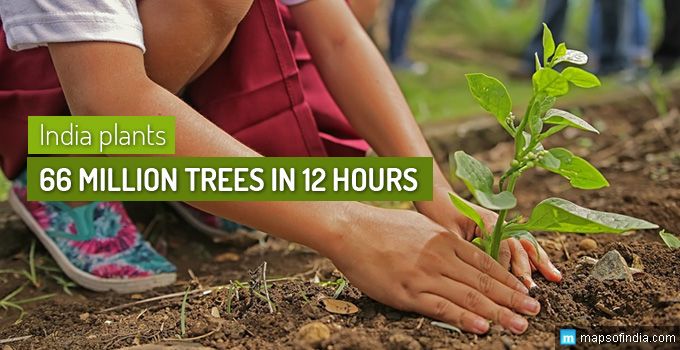India is in the forefront in its commitment to the Paris Agreement, and 1.5 million citizens of India, supporting the cause of the nation, gathered along the Narmada River in the state of Madhya Pradesh, and helped in planting 66 million trees in just 12 hours, last Sunday, 2 July, 2017. To keep things in perspective, it equals the entire population of cities in the US like Philadelphia working towards a cause.
In fact India beat its own Guinness Book of World record of planting 49.3 million trees last year in the northern state of Uttar Pradesh in 24 hours. This action taken was in a bid to honour a pledge made at the Paris Climate Change Conference. The sapling planted along the banks of Narmada River will ensure a constant water supply and thus there is a greater likelihood that most of these trees will reach adulthood.
Spearheaded by the Madhya Pradesh Government under the helm of Shivaraj Singh Chauhan, 24 districts participated in the drive of planting trees. 1.5 million people including men, women, elderly and children alike helped in the cause and succeeded in planting 66.3 million saplings from 7am to 7pm.
Paris Agreement (Accord de Paris)
Also called the Paris climate accord, and Paris climate agreement, is an agreement within the United Nations Framework Convention on Climate Change (UNFCCC) dealing with greenhouse gas emissions mitigation, adaptation and finance starting in the year 2020.
Under this agreement, the countries which have signed the pact, determine, plan and regularly report their contribution towards mitigating global warming.
India has shown that it is indeed absolutely committed towards a greener and a cleaner environment, and will work relentlessly towards providing a healthy and a safe future for the children of today. This drive was only a part of a larger environmental focus which includes reforestation of 235 million acres of land in the country by 2030 (12 per cent of its land) and help mitigate the effects of climate change. It has pledged $6.2 billion towards the same.
India understands that till now it has been one of the largest CO2 emitters. It is unfortunately ranked at the third position where leaving carbon footprints is concerned. However, realisation has set in among the leaders and citizens alike, especially after the signing of the Paris Agreement.
Changing gears from the target of tripling the coal-fired electricity generation by 2020, India’s coal-fired plants are on average running below 60 percent capacity. The prices of renewable energy have been slashed and thus there will also be no requirement for additional coal-fired plants in the next decade.
Renewable energy will act as the a tipping point in the energy landscape since, according to the World Economic Forum, for the first time, solar and wind electricity generation is the same price or cheaper than fossil fuel based electricity.
Prime Minister Narendra Modi has also pledged under the Paris Agreement that 40% of India’s electricity capacity will be generated from renewable sources by 2030.
A Green Earth
Deforestation and forest degradation is the permanent destruction of forests in order to make the land available for other uses. A study conducted by the United Nations’ Food and Agriculture Organization (FAO) revealed that an estimated 18 million acres of forest, which is roughly the size of the country of Panama, are lost each year. NASA predicts that if current deforestation levels proceed, the world’s rainforests may be completely gone in as little as 100 years.
Deforestation makes up for 17 % of the world’s carbon emissions, and thus exacerbating climate change. 17% of world’s carbon emissions means it is more than the entire world’s transportation sector, according to the United Nations.
The good news is that the world, including India, is slowly waking up to reality and realising that it has been literally molesting the earth which has forever nurtured life. The step towards the right direction has already been initiated by India as well as other countries. Though it will take a very long time to undo the harm already done, the first step in the right direction always does make the difference.





